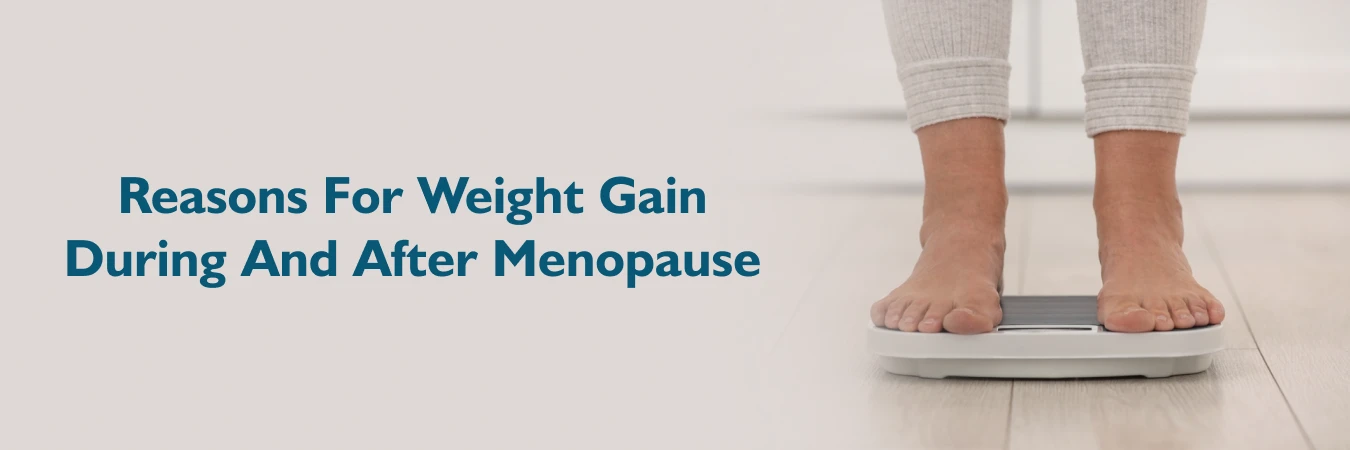- Cardiology 84
- Dermatology 45
- Endocrinology 33
- ENT 16
- Fertility 190
- Gastroenterology 78
- General-Medicine 81
- Gynecology 80
- Hematology 19
- Infectious-Diseases 33
- Neurology 52
- Oncology 34
- Ophthalmology 23
- Orthopedics 69
- Pediatrics 31
- Procedure 23
- Public-Health 144
- Pulmonology 59
- Radiology 8
- Urology 68
- Wellness 161
- Woman-and-child 77

Reasons For Weight Gain During And After Menopause
Menopause is the end of a woman's menstrual cycle.
This condition is diagnosed when a woman has gone 12 months without a menstrual period. Menopause usually occurs between the ages of 47 and 55. It may begin early in certain women due to underlying medical issues or previous procedures.
Why Does Menopause Lead to Weight Gain?
Menopausal hormone changes cause women to gain weight. During menopause, the production of estrogen reduces. As a result, women gain weight, especially around the hip area.
However, hormonal changes alone may not always result in menopause weight increase.
- Weight gain can also be caused by ageing, as well as lifestyle and hereditary factors.
- Muscle mass usually diminishes with ageing, whereas fat mass increases. Loss of muscular mass reduces the body's usage of calories (metabolism).
- This can make it more challenging to maintain a healthy weight. You are more prone to gain weight if you avoid physical activity.
- Menopause weight gain can also be caused by genetic factors. Women are more likely to accumulate abdominal fat if their parents do.
- Other factors, such as unhealthy eating, lack of exercise, and insufficient sleep, may contribute to menopause weight gain.
- People who don't get enough sleep tend to snack more and absorb more calories.
Does Menopause Cause Weight Gain
Weight gain during menopause might have major health consequences, including:
- Type 2 diabetes
- Heart and blood vessel diseases
- Breathing problems
Excess weight also increases the risk of various types of cancer, including colon, breast and endometrial cancers.
Menopause can be a life-changing experience in one's physical and mental state of being, with noticeable changes. However, with healthy habits, it’s possible to renew the post-menopause life and live to the fullest.
Lifestyle Changes Post-Menopause
There's no magic formula for preventing or reversing menopause weight gain. However, here are some lifestyle changes that can help to control weight:
Exercise
- Regular physical exercise is essential not just for reducing menopausal weight gain, but also for controlling other menopausal side effects such as hot flashes and mood swings.
- It improves insulin resistance, lowers the risk of osteoporosis,, and improves overall health.
Healthy Diet
- To maintain a healthy weight, consume more nutritional foods such as fruits, vegetables and whole grains.
- Avoid eating manufactured foods and consume foods high in calcium, fibre and iron. Follow a diet low in saturated fat and trans fat (partially hydrogenated fats).
Limit alcohol
Alcoholic beverages increase calorie intake and increase the risk of gaining weight. Therefore, it should be avoided.
Sleep routine
- Getting enough sleep is important for controlling one's weight. Avoiding too much caffeine or alcohol can help you sleep better.
- Exercising during the day can also help manage sleep.
Conclusion
During menopause, women may experience excessive bleeding. This could be related to the uterine lining thickening. Because of elevated oestrogen levels or a missed period, uterine lining may accumulate.
Some women also experience bleeding after menopause. This is not normal, and you should see the doctor right away because it could be an indication of endometrial cancer or any other health complications.
Ready to take control of your health journey? Book your appointment now and start your path towards wellness today!
Book an AppointmentFrequently Asked Questions
Women often gain weight during menopause due to hormonal changes, especially a decrease in estrogen levels.
Yes, as women age and go through menopause, their metabolism slows down, making it easier to gain weight.
Hormonal changes, particularly lower estrogen levels, can lead to increased fat storage, especially around the abdomen.
As women age, they may lose muscle mass, which can lower metabolism and make it easier to gain weight.
Some medications prescribed during menopause, such as hormone replacement therapy or antidepressants, can cause weight gain.
Yes, losing weight can be more challenging after menopause due to hormonal changes and a slower metabolism.
Excess weight gained during menopause can increase the risk of heart disease, diabetes, and joint problems.
Yes, regular exercise, including aerobic activities and strength training, can boost metabolism and help manage weight during and after menopause.
Some women find relief through natural remedies like mindfulness practices, herbal supplements, or acupuncture, but always consult with a healthcare provider first.
Yes, stress can lead to emotional eating and hormonal changes that contribute to weight gain during menopause.

- Cardiology 2132
- Dermatology 168
- Endocrinology 135
- ENT 97
- Fertility 217
- Gastroenterology 232
- General 478
- General-Medicine 1685
- Gynecology 169
- Hematology 85
- Infectious-Diseases 208
- Neurology 207
- Oncology 345
- Ophthalmology 65
- Orthopedics 187
- Pediatrics 83
- Procedure 72
- Public-Health 209
- Pulmonology 126
- Radiology 13
- Second Opinion 311
- Urology 294
- Wellness 600
- Woman-and-child 447
- Others 10217
Related Blogs
If you have any questions, please fill out the enquiry form or call us, and we will get back to you promptly.
040-68334455